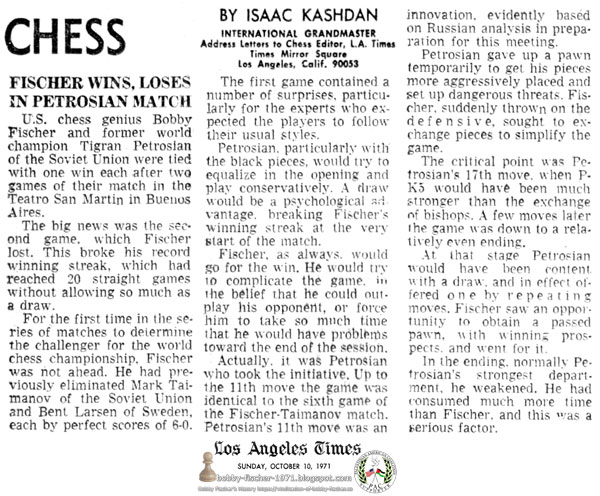The Los Angeles Times Los Angeles, California Sunday, October 10, 1971 - Page 108
Fischer Wins, Loses In Petrosian Match
U.S. chess genius Bobby Fischer and former world champion Tigran Petrosian of the Soviet Union were tied with one win each after two games of their match in the Teatro San Martin in Buenos Aires.
The big news was the second game, which Fischer lost. This broke his record winning streak, which had reached 20 straight games without allowing so much as a draw.
For the first time in the series of matches to determine the challenger for the world chess championship, Fischer was not ahead. He had previously eliminated Mark Taimanov of the Soviet Union and Bent Larsen of Sweden, each by perfect scores of 6-0.
The first game contained a number of surprises, particularly for the experts who expected the players to follow their usual styles.
Petrosian, particularly with the black pieces, would try to equalize in the opening and play conservatively. A draw would be a psychological advantage, breaking Fischer's winning streak at the very start of the match.
Fischer, as always, would go for the win. He would try to complicate the game, in the belief that he could outplay his opponent, or force him to take so much time that he would have problems toward the end of the session.
Actually, it was Petrosian who took the initiative. Up to the 11th move the game was identical to the sixth game of the Fischer-Taimanov match. Petrosian's 11th move was an innovation, evidently based on Russian analysis in preparation for this meeting.
Petrosian gave up a pawn temporarily to get his pieces more aggressively placed and set up dangerous threats. Fischer, suddenly thrown on the defensive, sought to exchange pieces to simplify the game.
The critical point was Petrosian's 17th move, when P-K5 would have been much stronger than the exchange of bishops. A few moves later the game was down to a relatively even ending.
At that stage Petrosian would have been content with a draw, and in effect offered one by repeating moves. Fischer saw an opportunity to obtain a passed pawn, with winning prospects, and went for it.
In the ending, normally Petrosian's strongest department, he weakened. He had consumed much more time than Fischer, and this was a serious factor.
Instead of trying to block the passed pawn, Petrosian tried for counter play, which proved too late. A last desperate attempt to give up his knight for Fischer's last pawn also failed.
In the second game Fischer played a complicated variation in which he gave up two pawns to get his king side pieces developed quickly.
Both players seemed familiar with the plan, and little time was consumed for the first 10 moves. Fischer could regain his pawns, but with no net gain.
Fischer delayed too long in recapturing the second pawn. He should have played either 12. … NxP or 13. … QxP(4). As the game went, Petrosian exchanged minor pieces in a manner which weakened Fischer's king side pawns, and prevented him from castling.
Fischer tried to simplify into an ending, a strategy which was successful in the first game.
Petrosian correctly playing for the attack, however. He sacrificed a pawn and then a rook for a bishop, to open the lines for his pieces. Once the black king was exposed, the end was near.
Fischer might have given up his queen by 22. … P-K7 & 23. RxQ RxPch, but, the resulting position would have been similar to that in the game. With Petrosian dominating.
With the black rooks unable to coordinate, and the white center pawns advancing, along with the mating threats, Fischer's difficulties increased. He could find no adequate defense in the final position.
A total of 12 games are scheduled on Tuesdays, Thursdays and Sundays. Today is an off day, however. The match will go to the first player to get 6½ points.
The victor will take on world champion Boris Spassky of the Soviet Union in a 24-game match next April and May. If Fischer is the challenger, he will be the first non-Russian in a title match since 1948.
Interest in chess is enormous in Buenos Aires. The playing auditorium seats 1200, and is filled long before the session begins, except for the first three rows, which are kept clear at Fischer's request.
Those who cannot get in gather in the large lobby of the theatre, where they can follow the game on special demonstration boards. One of the Argentine masters discusses the game while in progress.
The moves are also called in as played to a press room, equipped with telephones and typewriters. The moves are transmitted to the Argentine radio stations regularly, and go on the tickers of the news services, including AP and UPI, every few minutes.
During the first game several American and Russian grandmasters were asked to move to the balcony rather than the VIP seats first assigned to them.
The Americans included Larry Evans, acting as second for Fischer, Robert Byrne, and this editor. The Russians were Petrosian's second, Yuri Averbach, and Alexei Suetin.
No reason was given for the move by match arbiter Lothar Schmidt of West Germany. We were back to our original seats for the second game.
























